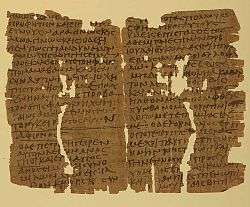Acts 8
| Acts 8 | |
|---|---|
|
Acts 8:26-32 in Papyrus 50, written in 3rd century. | |
| Book | Acts of the Apostles |
| Bible part | New Testament |
| Order in the Bible part | 5 |
| Category | Church history |
Acts 8 is the eighth chapter of the Acts of the Apostles in the New Testament of the Christian Bible. It records the burial of Stephen, the beginnings of Christian persecution, and the spread of the Gospel of Jesus Christ to the people of Samaria and Ethiopia.[1] The book containing this chapter is anonymous but early Christian tradition uniformly affirmed that Luke composed this book as well as the Gospel of Luke.[2]
Text
- The original text is written in Koine Greek.
- Some most ancient manuscripts containing this chapter are:
- Papyrus 50 (3rd century; extant: verses 26-32)
- Codex Vaticanus (AD 325-350)
- Codex Sinaiticus (AD 330-360)
- Codex Bezae (ca. AD 400)
- Codex Alexandrinus (ca. AD 400-440)
- Codex Ephraemi Rescriptus (ca. AD 450)
- Codex Laudianus (ca. AD 550)
- This chapter is divided into 40 verses.
Structure
This chapter can be grouped:
- Acts 8:1-3 = Saul Persecutes the Church in Jerusalem
- Acts 8:4-8 = Christ Is Preached in Samaria, Philip the Evangelist
- Acts 8:9-13 = The Sorcerer’s (Simon Magus) Profession of Faith
- Acts 8:14-25 = The Sorcerer’s Sin
- Acts 8:26-40 = Christ Is Preached to an Ethiopian eunuch
Cross references
- Acts 8:1-2: Acts 7:60 (Stephen's Death)
- Acts 8:33: Isaiah 53:7,8
Saul's Approval of Stephen's Death
The writer of Acts introduced Saul, later the Apostle Paul, as an active witness of Stephen's death in Acts 7:58, and confirmed his approval in Acts 8:1. Reuben Torrey, in his Treasury of Scripture Knowledge, wrote "This clause [i.e. verse 8:1] evidently belongs to the conclusion of the previous chapter; there is scarcely a worse division of chapters than this".[3]
Verse 16
- For as yet He had fallen upon none of them. They had only been baptized in the name of the Lord Jesus.[4]
Verse 37
- Then Philip said, “If you believe with all your heart, you may.”
- And he answered and said, “I believe that Jesus Christ is the Son of God.”[5]
This verse is absent from the majority of the Greek manuscripts, but it is present in some, including E (6th or 7th century). It is cited by Irenaeus (c. 180) [6] and by Cyprian (c. 250),[7] and is found in the Old Latin (2nd/3rd century) and the Vulgate (380–400) translations. In his notes Erasmus says that he took this reading from the margin of 4ap and incorporated it into the Textus Receptus.[8] J. A. Alexander (1857) suggested that this verse, though genuine, was omitted by many scribes, "as unfriendly to the practice of delaying baptism, which had become common, if not prevalent, before the end of the 3rd century."[9]
See also
References
- ↑ Halley, Henry H. Halley's Bible Handbook: an abbreviated Bible commentary. 23rd edition. Zondervan Publishing House. 1962.
- ↑ Holman Illustrated Bible Handbook. Holman Bible Publishers, Nashville, Tennessee. 2012.
- ↑ BibleHub, Commentary on Acts 8:1 http://biblehub.com/acts/8-1.htm accessed 15 August 2015
- ↑ Acts 8:16
- ↑ Acts 8:37
- ↑ Citation on this verse by Irenaeus (c. AD 180): "[Philip declared] that this was Jesus, and that the Scripture was fulfilled in Him; as did also the believing eunuch himself: and, immediately requesting to be baptized, he said, "I believe Jesus Christ to be the Son of God." This man was also sent into the regions of Ethiopia, to preach what he had himself believed, that there was one God preached by the prophets, but that the Son of this [God] had already made [His] appearance in human nature (secundum hominem)" (Irenaeus (AD 140–200). Against Heresies. Book III).
- ↑ Citation by Cyprian: "For although in the Acts of the Apostles the eunuch is described as at once baptized by Philip, because "he believed with his whole heart," this is not a fair parallel. For he was a Jew, and as he came from the temple of the Lord he was reading the prophet Isaiah," (Cyprian (200–258). The Life and Passion of Cyprian, Bishop and Martyr. paragraph 3)
- ↑ Edward F. Hills (1912–1981), "The King James Version Defended: A Christian View of the New Testament Manuscripts" (1956). Chapter 8, The Christian Research Press; 4th edition (August 1997) ISBN 0915923009 ISBN 978-0915923007
- ↑ The Acts Of The Apostles, by J. A. Alexander, New York: Scribner, 1967, vol. 1, pp. 349–350.
